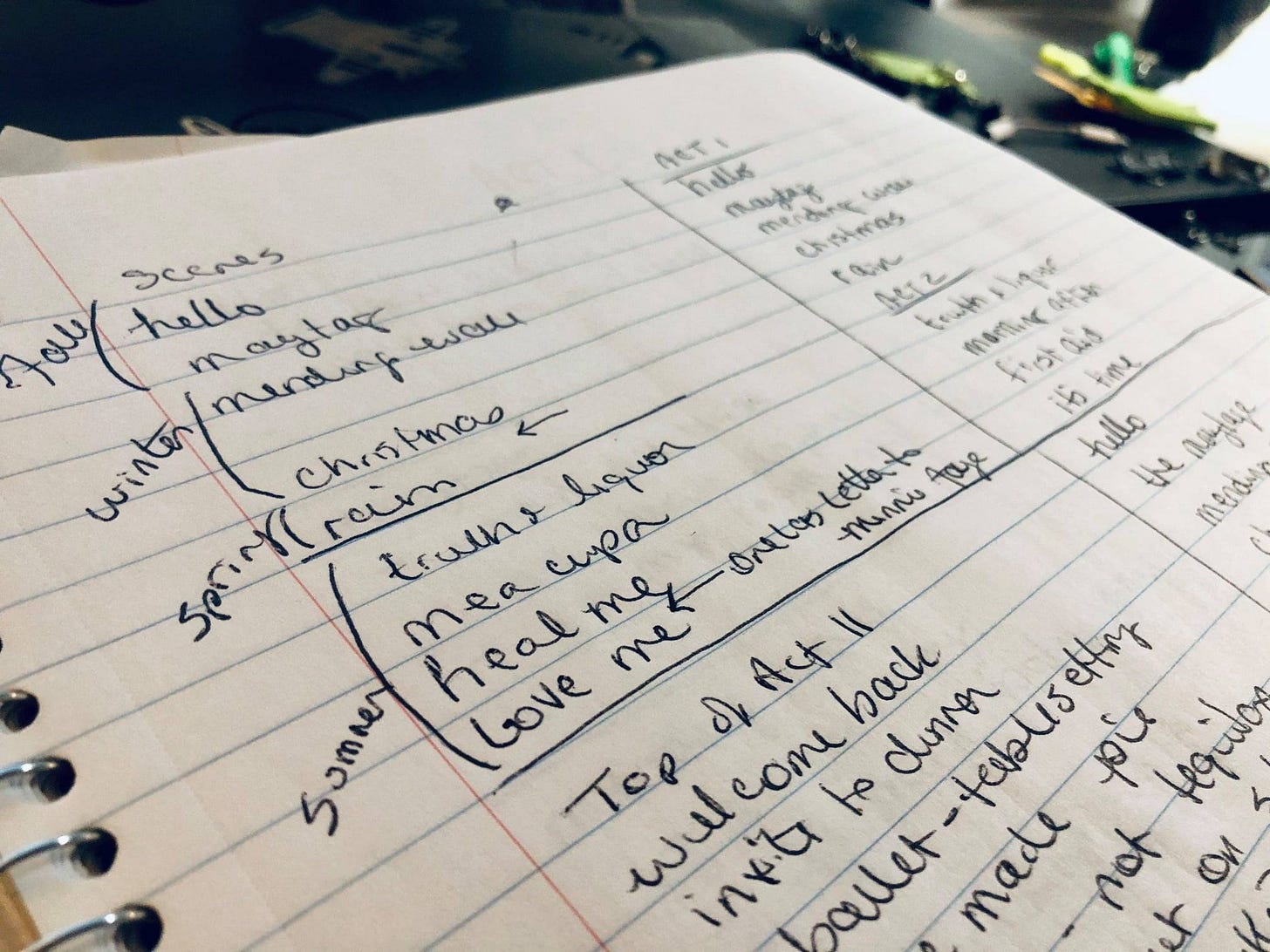I first shared this list on social media nearly five years ago. I recently dusted it off and thought I’d share it here. Enjoy!
Turn off spellcheck and grammar check until you actually need them. They distract and waste valuable time—you should be creating content, not chasing perfection.
Struggling with a big question? Step away from your desk and work through it during a shower, a walk, or a drive. Something magical happens—these “rote” activities let your brain write without distraction. When you return to your desk, things will be clearer.
These ^ activities are also great for working through dialogue or monologue—perfect for nailing the phrasing. Rehearse the moments aloud, repeating and refining as you go. Once you're happy with the flow, record it on your phone (and transcribe it later). This technique works beautifully for songwriting as well.
Work in a random order as ideas come in hot; worry about the "order" later.
Pile the sand and pile it high (write badly; write so badly the cops are involved); give yourself something to contour and reduce.
Need a zinger? The perfect name for something—or someone? Ask your Facebook friends. I do this with every one of my plays. It brings me joy and keeps me motivated.
Got a complex script? With lots of moving parts? Divide a sheet of paper into sections, with each square representing a segment of your piece. In each box, note the key events that have happened—or need to happen. Empty boxes highlight moments you want to explore or experiment with.
Below are my notes from Maytag Virgin, after I'd written about 70 pages and completed a few table reads. On the left, I listed the seasons in which the play takes place. I wanted to ensure that pivotal moments aligned with the right seasons to harness their distinct emotional tones—while still maintaining a logical narrative flow.
At the bottom of the page, I sketched out a wordless scene (a “ballet”), along with what I imagined had occurred "offstage" during the summer months, which were bridged by an intermission. This at-a-glance layout was essential during rewrites. I referred to it often to stay organized and check the internal logic of the piece.
Incorporate an “opposite day” into your routine. If you usually work on a computer, spend a day jotting down notes, questions, ideas, sketches, memories, or research on paper. If you’re an analog person, switch to a computer for the day. You’ll be amazed at what surfaces—useful insights that wouldn’t (or couldn’t) emerge during your usual workflow. Typos become glaring. Ideas start flowing. Problems begin to untangle themselves.
Trouble getting started? Imagine a single moment or line of dialogue that excites you. Now write what caused it. Keep working backward until the conflict levels out or resolves. Once you have that segment, you’ve got options for how to move the story forward—and a delicious dramatic rise to use as your “true north.”
This also helps keep forced intentionality out of the process. Stop trying to write the ending first. Don’t confuse your high-impact moments with actual endings. Some of the most unforgettable moments in storytelling don’t come at the end—they land elsewhere.
Take A Few Good Men, for example: “You can’t handle the truth” isn’t the final line. It’s the moment we all remember—but the actual climax comes a beat later, when Tom Cruise demands, “Did you order the code red?” and Jack Nicholson finally roars, “You’re goddamned right I did!”
So, to recap: your biggest moment is often not the ending. Focus on those electric moments first. The ending will find you—I promise.
Housekeeping isn’t just about running spellcheck or catching typos. While some claim great writing is a magical gift, the best writers know the bulk of the work is about following a punch list—tinkering techniques that elevate, tighten, and sharpen a manuscript. Keep a running list of “grooming and hygiene” tasks you complete without fail at the end of each draft or rewrite. Commit to a regular practice of distillation, decluttering, and tensioning. Use my 52 Vocabulary Words for Playwrights as a starting point.
Let me know what you think of these hacks! Or share your top tips in the comments below. Happy writing! - Audrey
YES, I POST SUBMISSION OPPS
https://audreycefaly.substack.com/t/submissions (bookmark this page)
PREVIOUS ARTICLES BY AUDREY CEFALY
LEAN MORE ABOUT AUDREY
Visit my website for more about me and the work I do!
QUICK LINKS TO MY PLAYS
Audrey Cefaly's plays (Alabaster, Maytag Virgin, The Gulf, The Last Wide Open, Trouble) have garnered the Lammy Award, the Calicchio Prize, the NNPN Goldman Prize, the Edgerton, and a Pulitzer nomination. Her works have been produced at Signature Theatre, Cincinnati Playhouse, Barter Theatre, Merrimack Rep, Florida Studio, Florida Rep, Gulfshore Playhouse, and countless others. Cefaly is a Dramatist Guild Foundation "Traveling Master," an Arena Stage playwright cohort, and a recipient of the Walter E. Dakin Fellowship from the Sewanee Writers Conference. She is published by Concord Theatricals, Applause Books, Smith & Kraus and TRW.













Love this! I’m a big believer in writing out of order and figuring out structure later
Fantastic hack list, Audrey. Next week, I'll be joining a bunch of writers in The Vault at Toronto's Coal Mine Theatre. Called The Water Cooler, it'll offer uninterrupted writing ✍️ time, along with the chance for social connection. It'll be a completely new way for me to write: writing privately in public. https://www.thevaultcreationlab.ca/test-pilot-projects